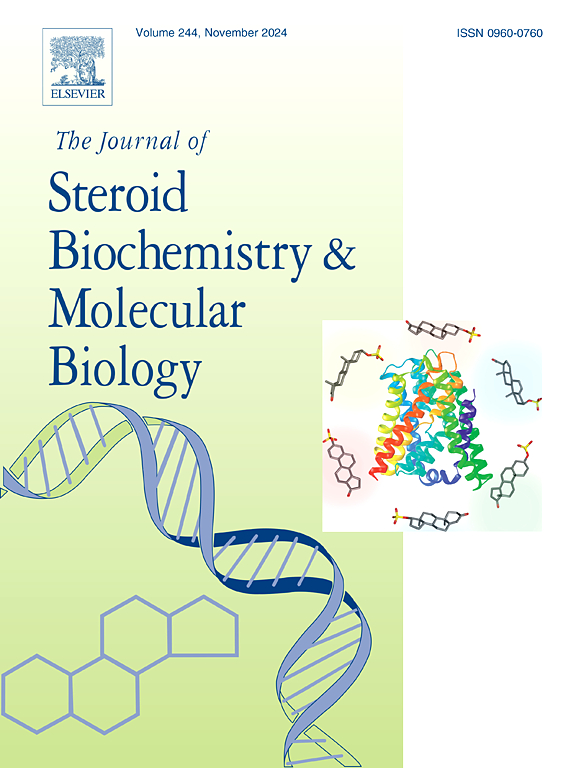Targeted deletion of Cyp24a1 in the intestine reduces mucosal injury and preserves epithelial proliferation after 5-fluorouracil treatment
IF 2.5
2区 生物学
Q3 BIOCHEMISTRY & MOLECULAR BIOLOGY
Journal of Steroid Biochemistry and Molecular Biology
Pub Date : 2025-09-05
DOI:10.1016/j.jsbmb.2025.106857
引用次数: 0
Abstract
Vitamin D has been proposed to attenuate chemotherapy-induced gastrointestinal mucositis (GM). In the intestine, local catabolism of active vitamin D [1,25-dihydroxyvitamin D₃] is mediated by the enzyme Cyp24a1. This study assessed whether deletion of Cyp24a1 specifically in intestinal epithelial cells can protect against 5-fluorouracil (5-FU)-induced intestinal injury and microbiome disruption in mice. Using the Cre-loxP system, Cyp24a1 was selectively ablated in the intestinal epithelium (IEC-KO mice). Male IEC-KO and Cyp24a1^fl/fl^ littermate control mice received a single intraperitoneal injection of 5-FU (450 mg/kg) or saline and were euthanised 48 h later. In control mice, 5-FU markedly reduced duodenal villous height and crypt area (p < 0.01), whereas IEC-KO mice retained intestinal architecture. Proliferation, measured by Ki-67 immunostaining, was preserved in both the small and large intestine of IEC-KO mice following 5-FU treatment (p < 0.05). Notably, colonic Tlr4 mRNA was significantly upregulated in IEC-KO mice (p < 0.001), with no corresponding increase in inflammatory cytokines. 16S rRNA sequencing revealed no change in overall microbial diversity; however, there were notable differences in the relative abundance of key taxa, such as Bifidobacteriaceae and Alistipes. These findings suggest that intestinal Cyp24a1 contributes to susceptibility to chemotherapy-induced intestinal injury and microbial dysbiosis, and that its deletion enhances epithelial regeneration, potentially via innate immune pathways.
在5-氟尿嘧啶治疗后,肠道中Cyp24a1的靶向缺失减少了粘膜损伤并保持了上皮细胞的增殖。
维生素D被认为可以减轻化疗引起的胃肠道黏膜炎(GM)。在肠道中,活性维生素D[1,25-二羟基维生素D₃]的局部分解代谢是由Cyp24a1酶介导的。本研究评估了肠上皮细胞特异性缺失Cyp24a1是否可以保护小鼠免受5-氟尿嘧啶(5-FU)诱导的肠道损伤和微生物组破坏。使用Cre-loxP系统,在肠上皮(IEC-KO小鼠)中选择性消融Cyp24a1。雄性IEC-KO和Cyp24a1^fl/fl^同窝对照小鼠一次性腹腔注射5-FU (450mg/kg)或生理盐水,48小时后安乐死。在对照组小鼠中,5-FU显著降低了十二指肠绒毛高度和隐窝面积(p < 0.01),而IEC-KO小鼠保留了肠道结构。Ki-67免疫染色法检测,5-FU处理后,IEC-KO小鼠小肠和大肠均保持了增殖(p < 0.05)。值得注意的是,在IEC-KO小鼠中,结肠Tlr4 mRNA显著上调(p < 0.001),而炎症细胞因子未相应增加。16S rRNA测序显示总体微生物多样性没有变化;但双歧杆菌科、双歧杆菌科等关键类群的相对丰度存在显著差异。这些发现表明,肠道Cyp24a1对化疗诱导的肠道损伤和微生物生态失调的易感性有贡献,并且它的缺失可能通过先天免疫途径增强上皮再生。
本文章由计算机程序翻译,如有差异,请以英文原文为准。
求助全文
约1分钟内获得全文
求助全文
来源期刊
CiteScore
8.60
自引率
2.40%
发文量
113
审稿时长
46 days
期刊介绍:
The Journal of Steroid Biochemistry and Molecular Biology is devoted to new experimental and theoretical developments in areas related to steroids including vitamin D, lipids and their metabolomics. The Journal publishes a variety of contributions, including original articles, general and focused reviews, and rapid communications (brief articles of particular interest and clear novelty). Selected cutting-edge topics will be addressed in Special Issues managed by Guest Editors. Special Issues will contain both commissioned reviews and original research papers to provide comprehensive coverage of specific topics, and all submissions will undergo rigorous peer-review prior to publication.

 求助内容:
求助内容: 应助结果提醒方式:
应助结果提醒方式:


